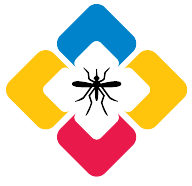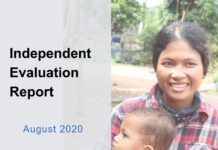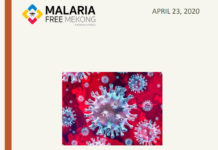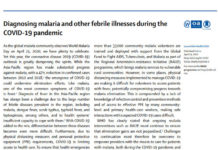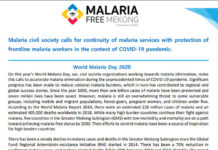25th April 2020 marks World Malaria Day 2020, which is observed at a time as COVID-19 continues to ravage health systems across the world five months since it was detected. Even as we are facing the devastation to health systems and economies from COVID-19, the Global Network of Civil Society for Malaria Elimination (CS4ME), Global Fund Advocates Network Asia-Pacific (GFAN AP), and Regional Malaria CSO Platform (GMS) express grave concern as the rate of progress globally towards malaria elimination has slowed down in recent years and given the current trajectory, we would not achieve malaria elimination by 2030.
The current COVID-19 pandemic further challenges malaria responses around the world and aggravates the plight of those who are most vulnerable to and affected by malaria. Pregnant women; infants and children; and mobile, migrant, internally displaced, and ethnic communities in malaria-endemic areas are facing multi-fold increases in their vulnerability to malaria, whilst nationwide lockdowns and curfews are in place to control the spread of COVID-19 across the world. Malaria health services including access to prevention, diagnostic testing, and treatment services have been disrupted across all countries in the Asia-Pacific region.
With additional stigma brought about by COVID-19, many affected individuals may not seek health services in fear of further stigma and discrimination. Furthermore, access to essential requirements such as food will pose a greater challenge for communities vulnerable to malaria such as migrant status, proof of identity, legal citizenship status, access to adequate financing, and as a result of structural discrimination, criminalization, and violence.
Therefore, we call upon all the stakeholders working towards malaria elimination, including governments, international funding agencies, WHO and technical partners, private sector, to work alongside communities and civil society to:
1. Ensure, while robust COVID-19 responses are in place, they do not compromise access to life-saving malaria prevention, diagnosis, and treatment services as this threatens the reversal of decades-long hard-fought progress against malaria
2. Ensure the continuation of safe, universal coverage campaigns for long-lasting insecticide-treated nets (LLINs) and indoor residual spraying (IRS). Focusing on reaching those at highest risk – Pregnant women; infants and children; and mobile, migrant, internally displaced and ethnic communities in malaria-endemic areas
3. Increase investments in the global malaria responses through direct domestic investments and investments in international financing organizations such as the Global Fund, to close the US$2 billion gap in malaria funding to develop transformative tools, reach the most vulnerable communities with the life-saving malaria interventions, and end malaria as an epidemic by 2030 to achieve UHC
4. Invest in building robust, resilient and sustainable systems for health with the inclusion of community and civil society responses and ensuring that every dollar invested in the fight against malaria contributes towards building stronger and more resilient systems for health
5. Solidify the engagement of communities affected by and vulnerable to malaria through establishing formal mechanisms for community engagement, increasing investments in building strong and sustainable community systems, and community-led and -owned interventions.
